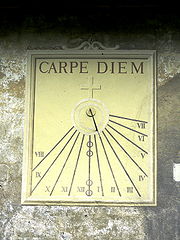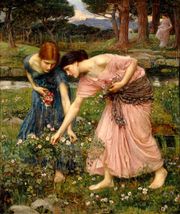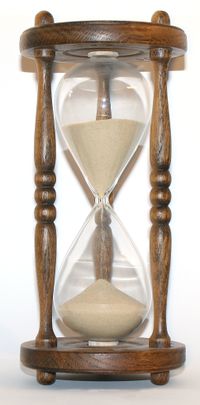Carpe diem

A sundial inscribed carpe diem
MeaningIn Horace, the phrase is part of the longer Carpe diem, quam minimum credula postero – "Seize the Day, trusting as little as possible in the future", and the ode says that the future is unknowable, and that instead one should scale back one's hopes to a brief future, and drink one's wine. This phrase is usually understood against Horace's Epicurean background.[2]. Related expressionsRabbinicThe phrase "And if not now, when?" (Pirkei Avoth 1:14) Other Latin
Gather Ye Rosebuds While Ye May, by John William Waterhouse.

An 1898 German postcard, quoting Gaudeamus igitur.
The phrase Collige, virgo, rosas [...] ("gather, girl, the roses") appears at the end of the poem De rosis nascentibus[3] (also called Idyllium de rosis) attributed to Ausonius or Virgil. It encourages youth to enjoy life before it's too late; compare "Gather Ye Rosebuds While Ye May" from To the Virgins, to Make Much of Time. Related but distinct is the expression memento mori ("remember that you are mortal"); indeed, memento mori is often used with some of the sense of carpe diem. However, two major elements of memento mori are humility and repentance, neither of which figures prominently in the concept of carpe diem. So the two phrases could also represent opposing worldviews: with 'carpe diem' representing carefree, overflowing life and 'memento mori' a humble, meek existence, though this is not the original usage of the phrase by Horace. Similarly, ubi sunt – "where are they [now]?" – invokes transience and meditation on death, but is not an exhortation to action. Compare Dead Poets Society, where a trophy case filled with pictures of long-dead boys ("these boys are now fertilizing daffodils") leads to an invocation of carpe diem. De Brevitate Vitae ("On the Shortness of Life"), often referred to as Gaudeamus igitur, ("Let us rejoice") is a popular academic commercium song, on taking joy in student life, with the knowledge that one will someday die. It is medieval Latin, dating to 1287. Horace himself parodies the phrase in another of his poems, 'The town mouse and the country mouse'. He uses the phrase carpe viam meaning 'seize the road' to compare the two different attitudes to life of a person (or in this case, a mouse) living in a city and in the countryside. SourceOriginal usage from Odes 1.11, in Latin and English:
Popular cultureRobin Williams's character in the film Dead Poets Society (1989) says, "Carpe diem. Seize the day, boys. Make your lives extraordinary." The American Film Institute ranked this line number 95 in its list of the 100 best quotations in American film history.[4] The TV series Community has paid homage to Dead Poet's Society's use of the phrase by having an annoying professor in the vein of Robin Williams, who over-enthusiastically makes his students "seize the day" to pass the class. British Rock Music Artist-Producer Marc Malone, released his first promo single, entitled "Carpe Diem Today", translating to "Seize The day Today". The song's lyrical concept is based around the idea of somebody who realises they're wasting their lives in apathy, therefore realising the only way to live, is to "Seize The Day".[5] [6] See also
References
External links
|
|||||||||||||||||||||||||||||||||||||||||||||||||||||||
